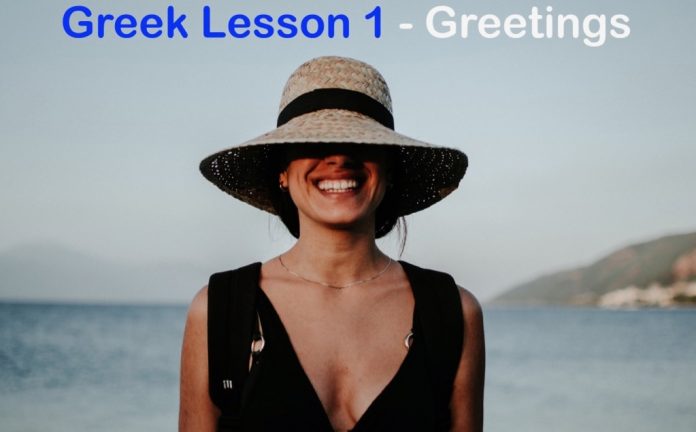This is the best way to learn Greek fast. Why? Because I have made it as easy as possible.
Beginners will learn Greek faster than any other method available online.
I know it’s a big claim, but I have made sure that this Greek lesson is excellent with the assistance of George, a fluent Greek speaker born and raised in Athens, Greece.
This will allow you to focus clearly on learning how to speak Greek with the confidence that the information provided is good quality.
You will also gain a greater understanding of how these greetings are used in Greek society.
The method devised below is a quick and relatively simple method for you to learn Greek, and it won’t require much thinking. It’s also free!
Just say the Greek words (in the blue and red colors) out loud when you see them.
You will learn the major Greek greetings in 5 minutes or so with this easy-to-follow Greek language guide.
This first lesson on Greek greetings will teach you how to say things like hello in Greek.
However, this lesson won’t teach you how to read and write in the Greek language using the Greek alphabet.
This will only confuse you at this stage, and it will slow you down enormously. Your brain won’t know what to focus on.
It will distract you. Don’t go down that path until you first have some ability to speak Greek.
Learning Greek for beginners shouldn’t be as complex as other online platforms make it out to be.
I have tried many of them, and I haven’t found one of them with a teaching method that I like.
They all made me want to give up! That’s why I am creating my own Greek lessons.
Learn to Speak Greek first
The main reason for the creation of these Greek lessons is to learn Greek myself.
I want to learn Greek in the simplest and most effective way possible without confusing distractions.
I really believe you should learn how to speak Greek first. This will allow you to speak a little Greek while in Greece.
Imagine going on a vacation to Greece and being able to speak a little Greek.
It will make your time in Greece so much better.
Learning how to read and write in Greek will definitely slow your progress down. Let’s skip it for another time.
This is the very first Greek lesson which will eventually become a series of Greek lessons.
I’m sure everyone wanting to learn Greek will better understand the Greek language by the end of each lesson.
Let’s see what happens?
Greek Lesson 1
The following Greek lesson will focus on the first few initial words (Greetings) you would generally say when you meet a person, friend, family member, or a group of people.
To learn Greek in this lesson, make sure you speak all of these Greek words (shown in blue and red colors) out loud.
Say each greeting at least 10 times, as shown under the English definition.
Don’t worry too much about getting the pronunciation perfect. Just try and pronounce it as you see it.
I have included several English spelling variations to help you pronounce the Greek words correctly. One version is shown in blue, the other in red.
Try and visualize talking to someone when saying these words. It will help you memorize the words.
Remember, this method of learning Greek requires you to say the words at least 10 times out loud. Don’t skip on this.
Greek Greetings
Good luck on your journey to learning Greek!
Hi / Hello
Yah
Yah
Yah
Yah
Yah
Ya
Ya
Ya
Ya
Ya
Explanation of when to use Yah as a greeting:
This is a common way of saying hello.
If you want to say “Hi” in a less formal way, you say Ya.
The meaning behind it is that you wish someone to be healthy.
It’s a greeting normally given to a friend, family relative, or child.
This is the most common way to greet friends and family.
You can use this greeting throughout the entire day.
This is also a way to say goodbye in an informal situation.
You can also add to this word. Yah-sou, when you greet a friend. Yah-sas is used for the elderly or when you greet a group of people in a formal setting. This is explained further down.
Hello / Hi / Hey
YAH-sou
YAH-sou
YAH-sou
YAH-sou
YAH-sou
Ya-soo
Ya-soo
Ya-soo
Ya-soo
Ya-soo
Explanation of when to use YAH-sou as a greeting:
Ya-sou is used a lot between friends and people you know very well.
It’s a greeting for a friend or a family member. It implies familiarity.
Though you can still use it when you don’t know someone. For instance, when you approach someone at a bar. This is explained further down under Greek Language Tips.
“Ya” is the more common greeting between “Ya” and “Ya sou” for family and friends.
This Greek Greeting is rather similar to “ciao” in Italian. You can use YAH-soo as both “hello” and goodbye” because hello and goodbye are the same words in the Greek language.
The sou is for just one of you!
Ya-sou is also a common way to greet a child.
It is also often followed by the name of the person. Ya-sou George.
Hello (more than one person / formal)
YAH-sas
YAH-sas
YAH-sas
YAH-sas
YAH-sas
Ya-sas
Ya-sas
Ya-sas
Ya-sas
Ya-sas
Explanation of when to use YAH-sas as a greeting:
This is a greeting for more than one person.
If you greet a group of people, you would say, YAH-sas.
It’s also a more formal and polite way to greet an unknown person.
If you want to be more polite with an older person, you say Ya-sas. This is often said to older people.
If you greet an older couple you also say “Ya sas.”
It’s a greeting for your boss, someone of higher status, or someone significantly older than you.
You wouldn’t say this to a child though.
Ya-sas would also be a suitable greeting for a supermarket worker, bank worker, doctor, and a public sector employee.
Hotel staff often use this as a way of greeting guests.
This is also another way to say goodbye.
Don’t get confused: use “Sas” when you want to be formal (older people, formal business meeting, etc), and keep “sou” when talking to friends or people you know.
Hi, how are you doing?
Ya, ti ka-neis
Ya, ti ka-neis
Ya, ti ka-neis
Ya, ti ka-neis
Ya, ti ka-neis
Yah, tee kah-nis
Yah, tee kah-nis
Yah, tee kah-nis
Yah, tee kah-nis
Yah, tee kah-nis
Explanation of when to use Ya, tee ka-nis? as a greeting:
A typical way to greet someone is to say Ya, ti kanis? – Hi, how are you doing?
“Ti kanis?” means “How are you doing?” or, more simply, “How are you?”
“Ti kaneis?” can mean two different things. It means “how are you?” and also “what are you doing?”
Hello, my friend …….
YAH-sou fil-le mou ……
YAH-sou fil-le mou ……
YAH-sou fil-le mou ……
YAH-sou fil-le mou ……
YAH-sou fil-le mou ……
YAH-soo fil-le moo ……
YAH-soo fil-le moo ……
YAH-soo fil-le moo ……
YAH-soo fil-le moo ……
YAH-soo fil-le moo ……
Explanation of when to use Yah-soo fil-le mou as a greeting:
fil-le mou – my friend
Using this greeting will make a friend of yours feel very special.
Remember to say their name where the dots appear. Yah-soo fil-le moo Yanni.
If you didn’t know, Yanni is the Greek name equivalent to John.
Hey
E-la
E-la
E-la
E-la
E-la
Ella
Ella
Ella
Ella
Ella
Explanation of when to use Ela as a greeting:
It means Hey. If someone answers the phone to a close friend or family member, they may say Ela, ti kaneis? Hey, how you going?
Ela Sophie. Hey Sophie!
It is the most popular way to answer the phone informally.
Greeks often use it as a greeting like “Hey.” It’s not just over the phone, but yes, most of the time it is.
Someone else online even stated that it is used 99% of the time over the phone.
The word Ela also means come or come now.
Ela has multiple other meanings, which will require a lesson in itself. For instance, “Ela” is actually like “come on” -“Ela tora John” is like “Come on now, John,” with a pun. You can also use it to express surprise like ‘Wow”. The literal meaning of “Ela” is used for something like come over “Ela stis 7,” which means “Come at 7.”
Good Morning
Kali-mera
Kali-mera
Kali-mera
Kali-mera
Kali-mera
Kah-lee-MER-ah
Kah-lee-MER-ah
Kah-lee-MER-ah
Kah-lee-MER-ah
Kah-lee-MER-ah
Explanation of when to use Kalimera as a greeting:
Kalimera means good day. It’s used as a way of saying Good morning.
One thing to remember is that it is only used as a greeting during the day.
kali + mera (good + day)
You would normally say this greeting until 12 pm.
People still claim to hear it being used as late as 1-2 pm.
If you go for a walk in the morning, someone may give you this greeting as they walk past. Alternatively, you can say it to someone as a polite good morning greeting.
Most Greeks would say this every day to their family and friends.
After that, you can use Ya as the standard greeting.
You can use the greeting Kalimera when arriving and also when leaving a place.
Good afternoon / Good evening
Kali-spera
Kali-spera
Kali-spera
Kali-spera
Kali-spera
Kah-lee-SPER-ah
Kah-lee-SPER-ah
Kah-lee-SPER-ah
Kah-lee-SPER-ah
Kah-lee-SPER-ah
Explanation of when to use Kali-spera as a greeting:
It means good evening. Also used as a Good afternoon greeting.
You can use Kali-spera as a greeting from late afternoon/dusk and well into the evening.
You may hear this greeting as early as 12 pm, however a bit later in the day is probably more appropriate. Say from 1 pm onwards into the late evening. If you want to go by the book, some might say that you use Kalispera between 12 pm and 11:59 pm. But Kalispera is more of an early evening to late-night thing. There’s nothing wrong if you say Kalispera at 8 pm. And there’s also nothing wrong to say Kalispera at 2 am if you are just introduced to somebody. Imagine Kalispera as more of a night salutation in general. The word “espera” stands for the “night” in Greek, in a super old-fashioned and totally unused way. So, if it’s night outside you are good to go with it.
You wouldn’t say Kalispera when you’re leaving someone or a place. It’s only used as a greeting.
Kalispera is super common. Many Greeks prefer to say “Ya” any time of the day, but you hear Kalispera every day in Greece.
You can easily go to a restaurant or even a club or a bar in the evening and greet the personnel with Kalispera.
George would most likely pick “ya”. But lots of my friends would say Kalispera instead.
It sounds slightly more formal than “ya” but no one will raise an eyebrow if you say Kalispera.
It’s a salutation you can use in every aspect of daily life, from the supermarket to a 5-star hotel, from the club bouncer to your parents. It’s up to you really.
For some, it might sound like older people’s language, but you can be assured that even youngsters use it.
Ya or ya-sas is what you hear the most but there’s a bunch of people using Kalispera from late afternoon on.
Kalispera sounds a tad more polite than “ya” but not something extreme. If you want to sound a bit more polite you can use it, but no one will take you wrong if you say “ya”.
How’s it going?
Pos-paye
Pos-paye
Pos-paye
Pos-paye
Pos-paye
Pos-paei
Pos-paei
Pos-paei
Pos-paei
Pos-paei
Explanation of when to use Pos-paye as a greeting:
This is a Greek slang greeting. The English equivalent of How’s it going?
This greeting is extremely common. You can use it all the time in Greece too. And you can also say it even to people that you speak more formally.
More Greek Greetings
You may also hear the following greetings being used:
He-reh-teh – (where the e’s sound like egg) this is normally a very formal greeting reserved for politicians, teachers, etc. Herete is really old-fashioned. No one will complain if you say Herete, but it sounds from another era. Sometimes, when you watch a serious TV show about politics etc, the moderator might start by saying Herete instead of Ya-sas. Herete may also be used when leaving as a goodbye.
Ka-LOS ir-thes – Welcome – (option 1 singular) Informally said to one person. Literally means “well you came,” so it’s very close to the English welcome.
Ka-LOS ir-tha-te – Welcome – (option 1 plural) If you want to be polite or if you talk to many people.
Kalos (Ka-LOS) seems to come from the Greek word kala – meaning good (well). If you only remember Kalos, you should be able to tell when receiving a welcome greeting by one or more persons.
Note: Welcome is made up of two words in Greek, while in English it is only one word. There are two options when using the welcome greeting. Here’s another way to say “welcome.”
Ka-LOS or-ree-ses – Welcome – (option 2 singular) Informally said to one person. Kalos orises is quite similar to “at your service” in English.
Ka-LOS or-ree-sa-te – Welcome – (option 2 plural) If you want to be polite or if you talk to many people.
Just remember that all of the Greek welcome greetings start with Kalos.
Pos-pa-ne ta pra-gma-ta – How are things going? (It’s a variation of how’s it going?)
Ti yinete – What’s up?
Ti nea / Ti trechei – What’s up? (a couple of more ways to say What’s up?)
Ya-hara – This adds more of a friendly tone to Hi. Ya is the Greek word for Hi. Hara actually means joy and happiness. When you say Ya-hara, it’s like wishing someone health and happiness.
Kalo apogeyma – Good afternoon
Kalo mesimeri – Good afternoon (with a long lunch and siesta in mind)
Popular Greetings to Remember
Ya – hi / hello (informal) – γειά
Yah-soo – hi (to one person you know) – γειά σου
Yah-sas – hello (formal/stranger/more than one person) – γειά σας
Ya, Ti kanis? – hi, How are you doing? – γειά, τι κάνεις?
Ela – Hey (often used as a greeting on the phone) – έλα
Kalimera – Good morning – Καλημέρα
Kalispera – Good evening – Καλησπέρα
Pos paei? – How’s it going? – Πώς πάει?
Greek Language Tips
Here are a few situations that may help you better understand when to use certain greetings.
- You approach a taxi in the morning at the airport and greet the driver – Kalimera (Alternatively, you could say Ya. or even Ya-sou when somebody is younger than you, if the taxi driver is 25 years old for instance. If you want to be very polite or if the driver is older, in their 70s say, you may may want to say Ya-sas.) You can also say “Kalimera sas” in the morning to a taxi driver even if he’s younger than you if you want to be extremely polite. It’s probably better to go with the non “sas” versions because this is an easy-going situation. The “sas” is really for elderly people, but if you want to be extremely polite, you can go with a “sas” attached. Saying “Ya” in this case is fine. Some Greeks prefer “Ya”/”Hi” instead of Kalimera/Good morning in general, unless it is very early in the morning like around 7 am.
- You approach a taxi in the afternoon at the airport and greet the driver – Kalispera (Alternatively, you could say Ya. If you want to be very polite or if the driver is older, say in their 70s, you may may want to say Ya-sas.) You can also “Kalispera sas” in the afternoon to a taxi driver even if he’s younger than you if you want to be extremely polite. It’s probably better to just go for the non “sas” versions because it’s an easy-going situation. Ya can be used at any time of day. Kalispera is super common, and you hear it every day in Greece.
- You approach a taxi at night at the airport and greet the driver – Kalispera (Alternatively, you could say Ya. If you want to be very polite or if the driver is older, say in their 70s, you may may want to say Ya-sas.)
- You approach and greet a woman at a bar – Ya sou, ti kanis? (Hi, how are you?). Note: You would say Ya-sou. You wouldn’t use Ya-sas when greeting a girl in a bar. Even if the woman is 70-80 years old, you don’t want to do that. Ya-sou is the way to go. Think of it more as if you want to get to know the lady really well. If that’s the case, then you want to talk to her as if you already know her. Does it make sense? I mean, you go for the very friendly way to break the ice. Ya-sou is more like “Hey there” or “Hey you” even. You can also go just for Ya, it’s more or less the same. You know, it’s one of these rather “automatic” greetings that you don’t pay attention to it. None of them is considered rude.
- You walk into a bar and you greet the guy behind the bar – Ya, ti kanis? OR Ya, pos paei?
- You go to a restaurant and greet the staff in the evening – Kalispera
- A super-rich Greek ship owner who is part of Greece’s political scene says “Kalispera” to you one evening. You reply – Ya-sas
- A plumber shows up at your door in the morning after you have spoken to him on the phone – Kalimera
- A plumber shows up at your door in the evening after you have spoken to him on the phone – Kalispera
- The most common way a Greek YouTube channel greets their audience – Ya-sas
- You see someone you know – You could say “Ya” to the person you know. But if you choose to say Ya-sou, you’d say their name after as well like this “Ya sou John.” With Ya-sou (without any logical reason) you also normally say the name of the person you know after the greeting.
- You have quickly developed a friendly relationship wth a hotel staff member – You can say Kalimera or Kalispera depending on the time of the day. It also depends on the relationship you want to build. If you want to keep it formal you always go with Ya-sas. If both sides seem confident, you can go for “Ya” soon after the first chat. If you feel comfortable you can say Ya-sou.
- You go for a long hike and you see a Greek local after seeing no one for a long time. You decide to greet the person – You could say Ya or Ya-sas, or Kalimera/Kalispera. The choice is yours. No need to say something different, these are all round greetings, and you can’t go wrong.
Greek Lesson Conclusion
Hopefully, this Greek lesson made it easier for you to understand how to greet people in Greek.
If you’re still not that confident in choosing the best greetings for you, keep your ears open when traveling around Greece.
Pay attention to how other Greek people greet each other in cafes, shops, and on the street.
It won’t take you too long to choose your own preferred Greek greetings after you’ve heard a few from the local Greek people.
The next Greek lesson will tell you different ways to say goodbye. What you can say when leaving.
This will be followed by a lesson on small talk, such as introducing yourself and finding out more about another person.
The way to ask a person how they are and the replies often given.
Stay tuned!
Key Greek words/phrases/sentences taught in LESSON 1: 8
They include: Ya (Hi), Ya-sou (Hi to one person), Ya-sas (Hi-formal), Ya, ti kanis? (Hi, how are you doing?), Ela (Hey), Kalimera (Good morning), Kalispera (Good evening), Pos paei? (How’s it going?)
Total number of key Greek words/phrases/sentences from all lessons so far: 8

Special thanks to:
George from Letters to Barbara for reviewing this Greek lesson and providing major contributions to improve it.
Pin it … Share it






